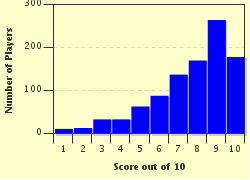Quiz Answer Key and Fun Facts
1. If you've been really naughty, then you'll get sent to jail. But, if you're British, how might you spell 'jail'?
2. "Waiter! Oh, waiter! I'll have the check, please!" Such a phrase is common in American restaurant parlance, but, believe it or not, the British spell 'check' differently. Think you know how to spell it?
3. Bling, bling, that's some sweet jewelry you've got. Yes, it's jewelry for our American friends, but we British add a couple of extra letters in our spelling. Can you spell it?
4. Who can forget Homer Simpson's memorable snow-moving song: "Mr. Plow, that's my name. That name again is Mr. Plow!" Of course, being American, Mr. Simpson spells it 'plow', but how would a Briton spell it?
5. "Brr, it's cold in here. Is there a draft? Yes, yes there is. It's coming underneath the door. Quick, grab that draft excluder before I freeze." A common scenario in many households, I'm sure, but how might this 'draft' be spelled by the British?
6. While many have made the switch to digital, there are those who still use analog. Of course, being British, we have to complicate it by having too many letters than are necessary for correct pronunciation. So what would the British spelling of 'analog' be?
7. "Okay, when you're ready, proceed onwards, making sure to perform the mirror-signal-maneuver routine." My driving instructor's words echo through my head constantly. If an American spells it 'maneuver', how does a Briton spell it? Watch out for those sneaky vowels.
8. "Ahead, just pull over on the left, not too close to the curb." Yet another piece of great advice from my driving lesson days. It's 'curb' in America, but in Britain, it's...?
9. Courage. Boldness. Bravery. Valor. Three of these four words are spelled the same in both lexicons, but it's the last one that differs. Only by one letter, though! How would 'valor' be spelled in Britannia?
10. Let's end on a sweet note. For my American pals, how about a coffee and a donut? For my British brethren and... sisterthren, how about a coffee and a... oh, how do you spell that?
Source: Author
eburge
This quiz was reviewed by FunTrivia editor
looney_tunes before going online.
Any errors found in FunTrivia content are routinely corrected through our feedback system.

